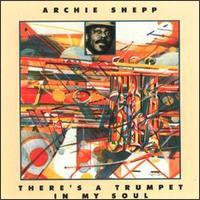ARCHIE SHEPP There's a Trumpet in My Soul
 Arista-Freedom 1016 (1975)
Arista-Freedom 1016 (1975)To kick things off, let's have a look at a sentimental favourite by tenor saxophone giant Archie Shepp. Shepp was a poet/ playwright/musician/actor/ composer from Philadelphia who was one of a number of artists signed to Arista Records' Freedom imprint. These musicians mostly played what was then termed "The New Thing", or "free jazz". This music had its roots in jazz, but allowed the artist to work outside of the strictures of the idiom, sometimes by ignoring chord structures and/or conventional rhythms. Shepp's music was noted for its political slant, as well as for its roots in the blues. He recorded prolifically during the sixties and seventies, and still performs today, though his recordings have become fewer and farther between.
I bought this album for $4.99 at Taz Records in Halifax, Nova Scotia sometime during the late nineties while in town for a friend's wedding. I love the look of these covers; nearly all of the Freedom releases used a similar design, and I would often buy them on sight even if I had never heard of the artist. Many jazz labels seem to inspire that kind of brand loyalty (hatArt, ECM, Tzadik) through jacket design alone.
The title suite is divided into two parts, one on either side of the album, with each part divided into three subsections. The first part opens with vocalist Semenya McCord singing the free-floating title track, followed by the brief, bouncy "Samba da Rua". "Zaid Part One" follows, which is nearly six minutes of Shepp blowing over a driving rhythm supplied by pianist Dave Burrell, drummer Beaver Harris, and either Jimmy Garrison or Vishnu Wood on bass (I'm guessing it's Garrison). The track fades out over a tuba solo by Ray Draper.
At the end of side one is "Down in Brazil", a bizarrely out-of-place vocal number sung by Bill Willingham and written by Harris and trumpeter Roy Burrowes. It's the type of song that you'd hear in an informercial for a cruise line, all happy horns and lilting Carribean rhythms, and yet it somehow works. Maybe it was intended as the album's sole shot at commercial radio airplay (which would make more sense if it weren't ten minutes long!).
Side two fades in on "Zaid Part Two", which features more energetic blowing from Shepp over Walter Davis, Jr.'s electric piano. Shepp is known for his brawny, almost boozy tone, which at times sounds like Ben Webster on a really mean bender. On this track, each player gets in a solo (sometimes two or three simultaneously), with the sound growing more frenzied and raucous, until we arrive at "It Is the Year of the Rabbit", a poetic recitation by Bill Hasson with accompaniment from the ensemble. There is a brief, final blast of "Zaid Part Three", and the record comes to a close.
Many critics cite this album as one of Shepp's lesser works and say that it lacks focus, but I like it because, despite its seemingly disparate parts, it works as a whole. It's a statement by a truly individual artist, a picture of what he was thinking and feeling at the time. Plus, it swings like a mo-fo.


2 Comments:
Wow, i am going out right now to try and find a copy of that album. The great thing about Archie Shepp LP's is that there's some good in them all! I'm currently listening to the 3 albums recorded in Paris, 1969 - Yasmina, a black woman; Poem for malcolm; and blase. All worth a listen if you haven't already.
I'm doing something similar to you over at my blog, The Daily Jazz so feel free to have a look...
Thanks, Craig! I bookmarked your blog and will check it out soon. I've been thinking about getting those Shepp albums you mentioned.
Post a Comment
<< Home